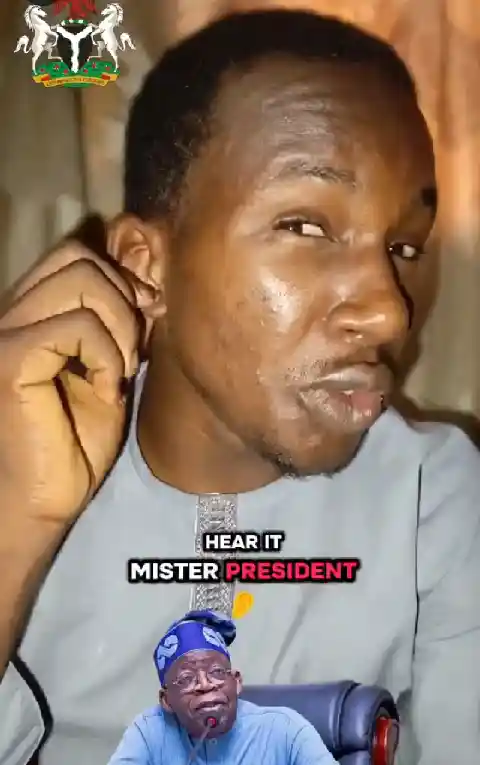Arewa Youth Issue Ultimatum to President Tinubu Over Insults to Prophet Muhammad (Watch Video)
- Advertisement -
Northern Youth Threaten President Tinubu Over “Insult Mohammed” Comments
A group of Northern youth has issued a stark warning to President Bola Ahmed Tinubu, telling him to retract comments they say decriminalise insults against Prophet Mohammed—or face “war.” The threat, captured in a video that has since gone viral on social media, underscores rising tensions over religious sensitivities and freedom of expression in Nigeria.
- Advertisement -
Viral Video Sparks Outrage
In the footage, which runs just over three minutes, a young man speaking on behalf of what he calls “the Northerners” addresses the President directly, accusing him of failing to protect Muslim sensibilities.
Also Read : Who Now Leads Delta APC as Oborevwori, Okowa’s Defection Sparks Inevitable Battles
- Advertisement -
“Good morning, Nigeria. So the President of Nigeria, Excellency President Bola Ahmed Tinubu, thought that we are afraid of him. Mr. President, for your information, we are not afraid of you,” the spokesman declares, pacing before the camera.
He goes on to reference a recent decision by the ECOWAS authority—where Tinubu served as chairman—that purportedly removed legal consequences for anyone who insults Prophet Mohammed.
“If you have forgotten,” the youth continues, “as ECOWAS Chairman, you signed a law saying that anyone who abuses a beloved Prophet Muhammad…there is no consequence or any law against him.”
- Advertisement -
The spokesman insists that Tinubu needs to “take back” his words, warning:
“Anybody that abuses the Prophet Muhammad—believe me, that person is gone forever. That person will be eliminated, whether you like it or not…Let this serve as a last warning to you. Don’t engage in any religion matter as President; you might cause war.”
Presidency Responds with Call for Unity
Officials in the Presidential Villa have condemned the threat as inflammatory and illegal. In a brief statement, Senior Special Assistant on Media and Publicity Bayo Onanuga said:
“Violent threats against the Head of State are wholly unacceptable. President Tinubu remains committed to upholding the Constitution, which guarantees both freedom of religion and freedom of expression. We urge all citizens to resolve their grievances through dialogue and the law, not through intimidation.”
- Advertisement -
He added that the ECOWAS decision referenced in the video “does not excuse violence or threats” and that any legal gaps would be addressed in forthcoming amendments to the national Criminal Code.
Religious Leaders Call for Calm
The Nigerian Supreme Council for Islamic Affairs (NSCIA) issued a separate communique urging restraint. Sultan of Sokoto Sa’ad Abubakar III, President-General of the NSCIA, said:
“We respect the office of the President and the rights of all Nigerians to express their views. However, threats of violence undermine our unity and run contrary to Islamic principles of peace and justice.”
Similarly, representatives of the Christian Association of Nigeria (CAN) condemned the video, warning that such divisive rhetoric risked stoking inter-faith conflict.
Legal and Political Context
Nigeria’s blasphemy laws vary by region: twelve northern states enforce Islamic penal codes with provisions for punishing insults against religious figures, while the federal Criminal Code only addresses religious disturbance, not blasphemy per se.
Earlier this year, Tinubu—then serving as ECOWAS Chairman—supported a regional resolution on free expression, critics say, that effectively decriminalised blasphemy across West African states. While the President’s office maintains the resolution aimed solely to curb politically motivated prosecutions, religious groups fear it weakens protections for faith communities.
Legal scholar Dr. Aisha Bello of the University of Lagos remarked:
“The ECOWAS resolution sought to harmonise laws on free speech, but it did not mandate abolition of domestic blasphemy statutes. The confusion over what was signed underscores the need for clear national legislation balancing free expression and religious harmony.”
Growing Friction Ahead of 2027 Elections
Analysts warn that such flashpoints could intensify as the country gears up for the 2027 general elections. Political strategist Gbenga Adeyemi noted:
“Religion remains a potent mobiliser in Nigerian politics. Any perceived affront to religious symbols can be weaponised by extremists on all sides. Leaders must tread carefully to prevent a local dispute from spiralling into broader unrest.”
In recent months, high-profile court cases and social-media campaigns over alleged blasphemy have already inflamed local tensions in Bauchi, Kano, and Kaduna states.
Path Forward: Dialogue and Legislation
Civil-society organisations are calling for a nationwide forum to defuse misunderstandings. The Nigerian Bar Association (NBA) is convening a special session next week to draft proposed amendments to federal laws, aiming to clarify the boundaries between protected speech and punishable religious insults.
NBA President Afam Osigwe said:
“We must safeguard free expression while ensuring no individual or group feels their faith is under siege. Constructive dialogue—backed by clear, consistent laws—is the only sustainable way forward.”
As the dust settles on this latest controversy, Nigerians await concrete action from both the Presidency and the National Assembly to reconcile constitutional freedoms with respect for religious beliefs. The stakes are high: failure to address the root causes of such threats could undermine national cohesion and jeopardise peace in the lead-up to the next elections.
- Advertisement -


